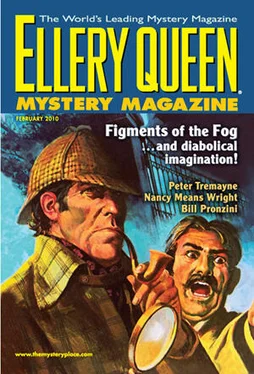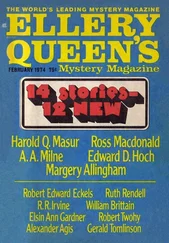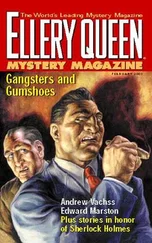Robert Barnard - Ellery Queen’s Mystery Magazine. Vol. 135, No. 2. Whole No. 822, February 2010
Здесь есть возможность читать онлайн «Robert Barnard - Ellery Queen’s Mystery Magazine. Vol. 135, No. 2. Whole No. 822, February 2010» весь текст электронной книги совершенно бесплатно (целиком полную версию без сокращений). В некоторых случаях можно слушать аудио, скачать через торрент в формате fb2 и присутствует краткое содержание. Город: New York, Год выпуска: 2010, Издательство: Dell Magazines, Жанр: Детектив, на английском языке. Описание произведения, (предисловие) а так же отзывы посетителей доступны на портале библиотеки ЛибКат.
- Название:Ellery Queen’s Mystery Magazine. Vol. 135, No. 2. Whole No. 822, February 2010
- Автор:
- Издательство:Dell Magazines
- Жанр:
- Год:2010
- Город:New York
- ISBN:нет данных
- Рейтинг книги:3 / 5. Голосов: 1
-
Избранное:Добавить в избранное
- Отзывы:
-
Ваша оценка:
- 60
- 1
- 2
- 3
- 4
- 5
Ellery Queen’s Mystery Magazine. Vol. 135, No. 2. Whole No. 822, February 2010: краткое содержание, описание и аннотация
Предлагаем к чтению аннотацию, описание, краткое содержание или предисловие (зависит от того, что написал сам автор книги «Ellery Queen’s Mystery Magazine. Vol. 135, No. 2. Whole No. 822, February 2010»). Если вы не нашли необходимую информацию о книге — напишите в комментариях, мы постараемся отыскать её.
Ellery Queen’s Mystery Magazine. Vol. 135, No. 2. Whole No. 822, February 2010 — читать онлайн бесплатно полную книгу (весь текст) целиком
Ниже представлен текст книги, разбитый по страницам. Система сохранения места последней прочитанной страницы, позволяет с удобством читать онлайн бесплатно книгу «Ellery Queen’s Mystery Magazine. Vol. 135, No. 2. Whole No. 822, February 2010», без необходимости каждый раз заново искать на чём Вы остановились. Поставьте закладку, и сможете в любой момент перейти на страницу, на которой закончили чтение.
Интервал:
Закладка:
“Very soon, however, the business took another unexpected turn. Perhaps one of the Italians was an expert in precious stones, and saw something in one of the diamonds to arouse his suspicion. He took out his revolver, a particularly fine piece of Italian workmanship, and struck one of the diamonds with the butt. It crumbled into dust. He struck another diamond, and another, and found that every one of the Caradoc stones was fake.
“We may imagine the scene, the consternation of the Italians, their oaths and suspicions that Barozzi had, by some obscure means, managed to deceive them and hidden the real diamonds elsewhere. But in truth, Barozzi had himself been deceived. He had removed the diamonds from the tiara in the dark, remember, and any skill he may have possessed to detect their true nature was blindfolded; indeed, he crushed one of the stones in removing it — I noted the powder on the side table in Her Grace’s room — but no doubt dismissed the sensation of dust in his hands as due to the crumbling of the mounting paste used to assemble the tiara. Had he been working with any light he would no doubt have perceived the truth.”
“I don’t understand this, Mr. Holmes,” said Lestrade. “If neither this Barozzi nor his murderers got their hands on the diamonds, who did?”
“Between ourselves, I think we may assume they have been sold secretly to some dealer and very probably dispersed beyond these shores.”
“But who sold them?”
“Why, the duchess, of course. She did her best to conceal from us the unfortunate state of her finances. But what aristocrat keeps no personal servants and is reduced to dining upon Huntley and Palmer’s biscuits in her hotel room, unless she is very seriously embarrassed? It is no secret that the duke left considerable debts, and I believe his widow has been impelled to sell her most precious asset, the diamonds which her late husband gave her as a wedding gift. The duchess had her tiara rigged with false stones, but felt such shame that when they disappeared during a seance she assumed the knowing spectre of the duke to have punished her for disposing of his gift. If you remember, Watson, I suggested that she might view his ghostly actions in a different light. After all, the stones were insured and, if stolen, as has now been reported in all the papers, the duchess could in due course expect to receive their value from the underwriters. Only she, and no doubt a trusted friend or two, and we three, know the truth.”
“But that is fraud, Mr. Holmes.”
“You are legally correct, Lestrade. But I suggest that, in this case, you withdraw your long arm. Who would not feel pity for an elderly noblewoman brought low through the ill fortune and misjudgments of her husband? And can we not be satisfied that, through the actions of the duchess, the Fratelli and the Spina Rossa have both been denied the benefit of her diamonds?”
“It is a pretty point,” said Lestrade, “and one on which I should be a poor policeman if I agreed. But perhaps I should be a poor Englishman if I did not.”
Holmes bowed to the inspector.
“But Holmes,” I said, “you have explained the loss of the diamonds, and how they came into the hands of the Fratelli. But who were those two dead men, and how did they meet their end?”
“They were the agents of the Fratelli, Watson. It seems the Spina Rossa quickly learned what had befallen Barozzi, and guessed that he had betrayed the hiding place of the diamonds to another society. It was a simple matter for me to locate the hideout of Barozzi’s murderers, and the agents of the Scarlet Thorn followed a similar procedure and sent assassins to despatch their rivals and retrieve the diamonds. They succeeded in the first task, but of the diamonds the only traces were a broken lock and a pile of grey powder. Whether they understood what had become of the stones I know not, but they left with empty hands, having drawn their symbol upon the wall in the blood of their rivals.”
In due course we heard from Lestrade that the Duchess of Caradoc had indeed been compensated for the theft of her diamonds. William Everson Hartshorne was told as much of the story as Holmes thought fit and, no doubt, slept a good deal more soundly in his bed thereafter. Of the agents of the Scarlet Thorn no trace was ever found, but the body of Barozzi was at length discovered in a garret in Seven Dials. He was horribly mutilated and Holmes identified him by his injuries, by the curiously stained female dress and box of makeup which were found in his possession, and by the presence, in a secret pocket in that dress, of a single artificial diamond.
Copyright © 2010 Paul W. Nash
Family Values
by Robert Barnard
Robert Barnard’s biting humor is one of his trademarks, and readers can depend on finding it even more frequently in his short stories than in his novels. In the greater space of a novel, he’s someone you can depend on also to provide a beautifully crafted whodunit. His superior puzzle-spinning and trenchant writing have earned him the Cartier Diamond Dagger (the CWa’s award for lifetime achievement) and membership in Britain’s esteemed Detection Club.

It was in June 1948 that Mrs. Cynthia Webber and her son Simon came to lodge in the Princes Hotel, Pixton. They were well received by the rest of the guests, all of whom were virtually residents. The country had just suffered one of the worst winters Britain had ever known: months of snow-covered land and roads, which, added to the regime of rationing and shortages that the nation had endured since 1939, brought many to the edge of despair. Most of the residents at the Princes blamed the government for the winter, and for everything else. “What did we fight the war for?” was a common wail. “We’d have been better off if we’d lost it.”
What was still called the Princes Hotel was in fact a mere wing of the splendid Edwardian structure that overlooked the town from a vantage point that had once seemed to square with the social status of its guests. It was now run by Mrs. Hocking, who was more a housekeeper than a manager. She had been put in mainly to keep the old place open. She didn’t want casual guests, which was lucky because few were to be had. She took residents at reasonable rates, commandeered their ration books and used them cunningly, and took the burdens of effort and decision from their shoulders. That was what the middle-aged and elderly residents wanted, particularly after the privations of the terrible winter. And when Mrs. Webber and her son arrived, they were welcomed as a new source of interest.
“She’ll do,” said Major Catchpole, a man of few words.
“Such a nice sort of person,” said Mrs. Forrest, meaning “so obviously a gentlewoman.” She added that it was lovely to see a mother and son who were such good friends.
Their arrival had been well signalled in advance because they had taken the suite. All the residents being, by chance or circumstance, single, “the suite” was the one area in the wing that was not let out. It had been used by families before the war, many of whom came to the Peak District for the sake of a disabled or invalid child, hoping the famous Pixton waters would do them good, if a cure was out of the question. It had two bedrooms with a sitting room between — not large rooms, but providing a degree of comfort and privacy unknown to the other residents. Mrs. Hocking, when she had received the inquiry had been dubious whether the suite was habitable, but with the help of an army of hotel and hospital cleaners, all resident in the town and experienced from the Old Days, the dusty old rooms were smartened up. Even the residents pitched in, with Miss Rumbold volunteering to wash up all the ornaments and crockery in the suite, and old Mr. Somervell, a traditional and sentimental soul, buying a bouquet with his own money to decorate the sitting room on the day of their arrival.
Читать дальшеИнтервал:
Закладка:
Похожие книги на «Ellery Queen’s Mystery Magazine. Vol. 135, No. 2. Whole No. 822, February 2010»
Представляем Вашему вниманию похожие книги на «Ellery Queen’s Mystery Magazine. Vol. 135, No. 2. Whole No. 822, February 2010» списком для выбора. Мы отобрали схожую по названию и смыслу литературу в надежде предоставить читателям больше вариантов отыскать новые, интересные, ещё непрочитанные произведения.
Обсуждение, отзывы о книге «Ellery Queen’s Mystery Magazine. Vol. 135, No. 2. Whole No. 822, February 2010» и просто собственные мнения читателей. Оставьте ваши комментарии, напишите, что Вы думаете о произведении, его смысле или главных героях. Укажите что конкретно понравилось, а что нет, и почему Вы так считаете.












